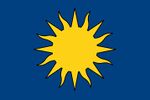Pyrinthia
The Pyrinthian Order | |
|---|---|
| Motto: “Unity is Prosperity” | |
| Anthem: “The Pyrinthian Battle Hymn” | |
Sydney, Australia | |
| Capital | Nova Anatolia |
| Largest city | Nuevo Roma |
| Official languages | English |
| Demonym(s) | Pyrinthian(s) |
| Government | Board of Generals |
| Legislature | Military democracy |
| Establishment | Unknown |
| Population | |
• Census | 1 |
| Currency | Hyperpyron |
The Pyrinthian Order, more commonly known as Pyrinthia, is a micronation in Australia.
It is a military state founded by an unknown individual at an unknown time. All citizens are required to enlist in the military, much like South Korea.
Their Flag, the Sacreflamme, is pretty much a knockoff Smithsonian Institute logo.
Contents
- 1Etymology
- 2History
- 3Politics and government
- 4Geography and climate
- 5Economy
- 6Culture and media
- 7See also
- 8External links
Etymology
Pyrinthia has a vibrant mix of cultures, Greek being one of the main cultures. Some cities/settlements draw their names from Greek and European locations, like the capital of Nova Anatolia, which is named after the region Anatolia. Pyrinthia itself is a mix of “Corinthia” and the Greek “Py” naming custom.
History
Pyrinthia was founded as New Corinthia, at some point in the late 2010s. In 2019, it changed its name to Pyrinthia and converted from a monarchy to a military dictatorship, briefly changing to a military democracy and back again.
During the Pyrinthian Conflict, It launched a full scale invasion of Maluhia, but was repelled by the defenders, leading to the Seestadt Convention and the Treaty of Nuevo Roma.
Later in 2021, the Pyrinthian Civil War broke out, leading to a humiliating defeat inflicted on the military power. Several citizens defected to the rebel Free Kingdom of Maluhia, and the nation entered a state of inactivity.
Second Maluhian War
Following their humiliating defeat in the Pyrinthian Civil War, the Pyrinthian government was quickly becoming unpopular, and thus they found a way to distract the angry populace- declare war for a second time on the Republic of Maluhia. It was a risky gambit, but if it worked it would pay off.
However, after a week, the Pyrinthian empire had been carved up by Maluhia, and the last citizen, the premier, was alone in the last pocket of the empire.
Politics and government
Pyrinthia is run by a military dictatorship, and according to visitors, the hallways of its house-capital Nova Anatolia are plastered with military posters.
All citizens that are of age are required to enlist in the military, and a significant portion of their budget (50% according to estimates) is spent on their military.
Law and order
Pyrinthia’s legal code is strict but fair- it follows the “eye for an eye” system but with alterations to suit Micronationalism, and makes the smallest of exceptions for those with mental illnesses.
Foreign relations
Pyrinthia is in an uneasy truce with Maluhia, due to their clashing ideologies.
It maintains neutral relations with smaller micronations in the area.
Military
Since Pyrinthia is all about the military, the army is an extremely well-disciplined force, able to conduct guerrilla warfare, conventional warfare and complex operations with ease. The soldiers are observed to wield bullpup gel assault rifles and a variety of gel blasters, including shotguns and snipers. They had an impressive arsenal of Airsoft weaponry but it was discarded after the Seestadt convention.
Economy
Since Pyrinthia is a military state, its economy is basic. The currency, Hyperpyrons, is backed up with the price of petroleum, and their main exports are mixed foods and goods, utilising personal vegetable patches which primarily produce tomatoes and cabbages.
Culture and media
The culture is a vibrant mix of European and American cultures- they speak French and English, grow Native American crops like maize and sweet corn, and national cuisine features American & European dishes like T-bone steak and burgers, and souvlakis. Religion is also encouraged, and citizens’ residences are dotted with shrines and altars. Their only news station, The Nationale, provides daily coverage in the form of distributed newspapers.
See also

